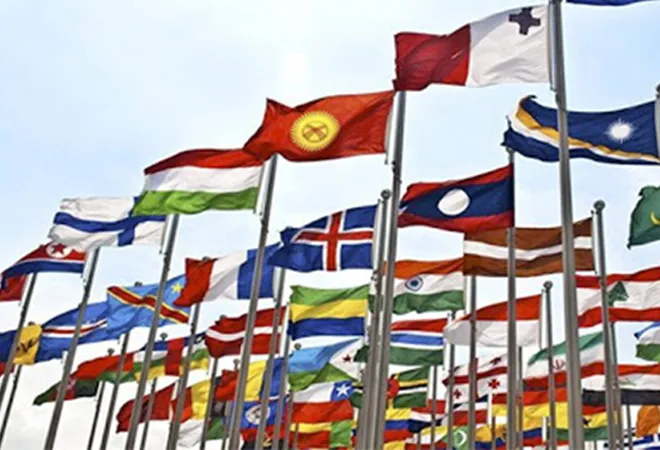
Even as the coronavirus pandemic unleashes its devastation across the globe, the great and the good have been quick to remind us of the value of multilateralism and the necessity to preserve it. And yes, they are right. To reduce the further spread of the virus, to develop effective medical treatments, to curtail the worst effects of the inevitable recession that is already in the offing, cooperation among nations will be necessary. But there is a problem: multilateralism is possibly at its weakest today, when the need for it is more dire than ever before. Unless the fundamental problem is addressed, no meaningful fix will be possible.
We believe that India may be uniquely positioned to help resuscitate multilateralism. With the United States facing multiple internal challenges including the prospects of a deeply divisive Presidential election in November, New Delhi (together with like-minded partners) could assume leadership in strengthening constructive transnational cooperation. At a time when China is facing a global crises of credibility, India may even consider a last-ditch attempt at mediation; to temper what is increasingly appearing as Beijing’s unilateralism revisionism; revive the promise of what was described by some as the gradual socialization of China into the international system; and its acceptance of the norms and values that regulate the principal multilateral institutions.
A Multilateral Mess
The malaise that afflicts multilateralism is not new (https://www.orfonline.org/expert-speak/the-malaise-of-multilateralism-and-how-to-manage-it/). The paralysis of all three functions of the World Trade Organization (WTO) – negotiation, dispute settlement, and transparency – was one sign of that deep-rooted malaise; the severely dented credibility of the World Health Organization (WHO) is just another more recent indicator. The pandemic has heightened the crisis of multilateralism, not created it. And amidst the many cracks in the system, it has deepened one especially dangerous fault-line: multilateralism, in its current form, is incapable of dealing with misuse by “systemic rivals”.
The underpinning assumption of the post-war multilateral system was that peace and prosperity went hand-in-hand. Some like-mindedness and a commonly-held purpose were also assumed among members: increasing economic integration and shared prosperity would help enhance these affinities and contribute to peace. Countries with fundamentally different domestic systems of governance did not form a part of this multilateral order, as was the case with the Soviet bloc in the Cold War years. None of our multilateral institutions were built for a world where the ties of interdependence – which were supposed to enhance the well-being of all – could themselves be “weaponized” for nationalistic gain, at the expense of other players (https://www.mitpressjournals.org/doi/full/10.1162/isec_a_00351?mobileUi=0). The misuse of existing rules (or loopholes within the existing rules) by several countries – especially by China (e.g. via forced technology requirements, IPR violations, and subsidies) – to gain an unfair advantage in trade relations was already attracting critique in the last years. But the pandemic has provided us with some even more alarming illustrations of how damaging the weaponization of global supply chains can be.
As death tolls rose (in some cases to catastrophic proportions) many countries responded with export restrictions on critical medical supplies. This was far from ideal, but almost inevitable given the absence of adequate stocks within countries, and little in the rules to curb export restraints. Recognizing the shortages that countries were facing – masks, PPE, ventilators and more – to deal with COVID-19, China offered to sell these products to countries in need. For instance, when the EU put up export restrictions, China stepped in at Serbia’s request. But China’s coronavirus diplomacy did not stop there. When India complained that test-kits imported from China were faulty, China slammed it for “irresponsible” behavior. When Australia indicated that it would conduct an independent investigation of China’s early handling of the epidemic, China threatened it with economic consequences. Add to this the dangers of using faulty equipment on critical patients, plus the risks that several actors – including the EU and India – see of predatory takeovers of their companies by China. The pandemic is teaching countries, through bitter experience, that weaponized interdependence is not just a theory but a practice that is rapidly evolving. And it can have life and death consequences.
Against this background, repeated calls by heads of governments and international organizations urging countries to remain committed to multilateralism ring hollow.
Reforming Multilateralism
To argue for a multilateral rules-based system will never suffice on its own; one must always address the issue of the goals and values that underpin the rules. The remedies are obvious.
First, of course, is the need for reassurance and policies that reflect a renewed commitment to the raison d’état of multilateralism. A “retreating” United States must, of course, demonstrate in word and deed that autarchy is not the way forward of this global crises and that it remains committed to strengthening the global supply chains which are based on the promise of ensuring global stability and the attendant promise of peace and prosperity.
Second, irrespective of the above, there is an urgent need for some strategic decoupling, handled smartly in cooperation with other like-minded countries. This will not happen overnight. And it will undoubtedly cause considerable disruption to existing global value chains. This in turn, will result in a shrinking of the global economic pie. We will be less prosperous. But we will also be more secure.
Third, flowing from the above, a multilateralism that recognizes the need for decoupling will necessitate closer cooperation with some and distancing from others. Membership of such renewed multilateral institutions would not be universal; rather, one would limit deep integration to countries with which one shares first-order values – such as pluralism, democracy, liberalism animal welfare rights, and more.
What Role for India?
The current crisis in multilateralism could be a remarkable opportunity for India – a country whose pluralism, democracy, and liberalism have often been underestimated by the west. At an immediate level, the gains are obvious: India has also maintained a consistent reserve about a blanket entrenchment in global value chains. As some constituencies in the west seek a gradual decoupling from China, they would be well-served to look towards India.
To make use of the opportunities, for itself and for the provision of certain global public goods, India’s cooperation with like-minded actors will be key. Here, India could work closely with the Alliance for Multilateralism – an initiative launched by Germany and France – to shape both the alliance itself and the reform agenda at large. Working together with a group of countries from the developed and developing countries could further amplify India’s voice.
But beyond these immediate gains could be a greater role for India. Not since Chernobyl has global public opinion lost faith in the competence and integrity of a great power as it has in China because of Covid 19 and the apparent malfeasance and the opaqueness with which it has dealt with the crises. While China may recover faster than most economically, and its military might remains intact, its image as a reliable partner has suffered a huge detent. Neither aid diplomacy nor the unleashing of Chinese soft power can easily recover the trust deficit that exists today between China and much of the rest of the world. While prudence may demand gradual decoupling in the long-term, it is critical to not be seen as immediately isolating China; with fewer stakes in world order, Beijing’s turn towards revisionism could be faster than anticipated. Instead, India could lead a coalition to bridge this defict of trust through a regime of incentives and sanctions that seek to embedd Beijing into a much more guided and directed socialisation into the rules of the international system. Here the strategic and economic have to be in consanance with each other; to wit, a Doklam and unfettered access to India’s markets cannot coexist together.
A shorter version of this essay appeared in The Hindu
The views expressed above belong to the author(s). ORF research and analyses now available on Telegram! Click here to access our curated content — blogs, longforms and interviews.




 PREV
PREV


